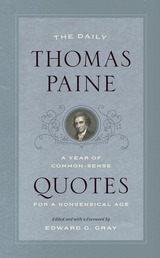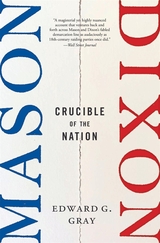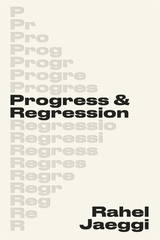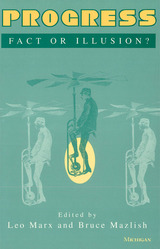
The Daily Thomas Paine offers a year’s worth of pithy and provocative quotes from this quintessentially American figure. Editor Edward G. Gray argues that we are living in a moment that Thomas Paine might recognize—or perhaps more precisely, a moment desperate for someone whose rhetoric can ignite a large-scale social and political transformation. Paine was a master of political rhetoric, from the sarcastic insult to the diplomatic aperçu, and this book offers a sleek and approachable sampler of some of the sharpest bits from his oeuvre. As Paine himself says in the entry for January 20: “The present state of America is truly alarming to every man who is capable of reflexion.” The Daily Thomas Paine should prove equally incendiary and inspirational for contemporary readers with an eye for politics, even those who prefer the tweet to the pamphlet.

“Deeply researched and highly readable.” —Eric Foner, Times Literary Supplement
“A rich history of regional distinctions, especially as they shaped the antebellum Republic.” —Kirkus Reviews
“A fitting testament to a career marked by boundary-crossing curiosity and stalwart service to the historical profession…[a] splendid new history.” —Richard Bell, Register of the Kentucky Historical Society
“Fascinating…does justice to the full sweep and complexity of American history by expertly tracing a century of change across one especially revealing patch of ground.” —James H. Read, American Political Thought
“Erudite, gripping, and highly significant. Gray puts his talents as a historian of the American Revolution and the early republic to excellent use, persuasively arguing that the Mason-Dixon Line is worth seeing as a geopolitical border.” —Kathleen DuVal, author of Independence Lost
Acclaimed scholar Edward Gray offers the first comprehensive history of the Mason-Dixon Line, a border at the center of early American political contestation. Formalized in 1767 to fully and finally demarcate Pennsylvania, Maryland, and Delaware, the Line resolved a longstanding jurisdictional conflict that had provoked bloodshed among colonists and ensnared Lenape and Susquehannock populations. In 1780, Pennsylvania’s Act for the Gradual Abolition of Slavery inaugurated a new phase, as the Line became a boundary between free and slave states and their distinct legal regimes. Then, with the passage of the Fugitive Slave Act in 1850, the Line became a federal instrument to arrest freedom-seeking Blacks. Only with the end of the Civil War did the Line’s significance fade, though it haunted the geography of Jim Crow.
Mason-Dixon tells the gripping story of colonial grandees, Native American diplomats, Quaker abolitionists, fugitives from slavery, capitalist railroad and canal builders, US presidents, Supreme Court justices, and Underground Railroad conductors—all contending with the relentless violence and political discord of a borderland that transformed American history.
READERS
Browse our collection.
PUBLISHERS
See BiblioVault's publisher services.
STUDENT SERVICES
Files for college accessibility offices.
UChicago Accessibility Resources
home | accessibility | search | about | contact us
BiblioVault ® 2001 - 2025
The University of Chicago Press









